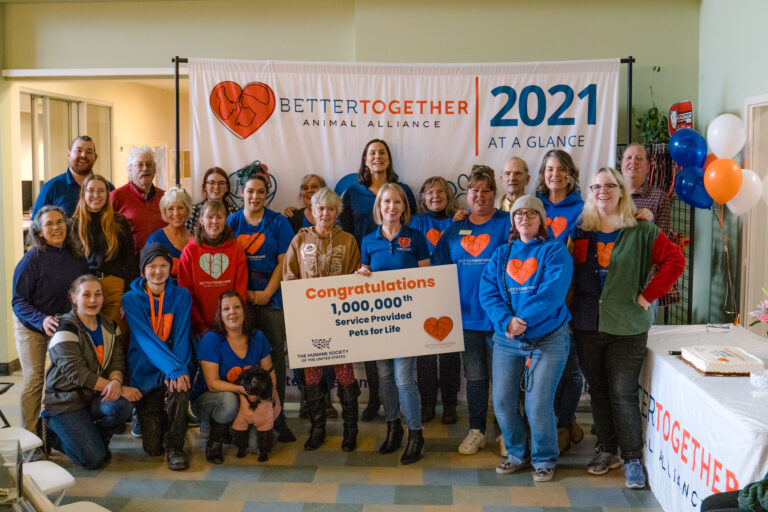Major milestone reached: nationwide program that supports pets in underserved communities provides its one-millionth service to a dog named Freeda
Pets for Life program brings access to care for people and their pets
This month, the Humane Society of the United States’ Pets for Life program reached a major milestone, providing its 1,000,000th service to animals. The recipient was a poodle mix named Freeda, who was helped through the program’s partner Better Together Animal Alliance in Ponderay, Idaho.
Pets for Life works to increase accessibility to resources through community programs that provide services like veterinary care, spay/neuter, grooming, behavioral training, pet supplies, and more at no cost to people and their pets in underserved communities. To date, over 250,000 pets have received support, including critical services and supplies. Many of the families have received multiple services through the program.
The mission of the Pets for Life program is to increase equity in access to care for all people and pets and making companion animal welfare more inclusive, just, and fair. Freeda’s service was a much-appreciated bath and grooming. She and her human mom Janis have been a Better Together Animal Alliance client for a year-and-a-half.
Amanda Arrington, senior director of Pets for Life, said, “It is incredibly important that our program honors the love people have for their pets and removes barriers to pet services that far too many people face. Thanks to over 50 partners across the country and our flagship markets in Los Angeles and Philadelphia, we ensure families have what they want and need for their pets. The work Better Together Animal Alliance is doing in their Idaho community is an example of support being provided in communities across the country. We are proud of and grateful to all who have helped us reach this millionth service milestone and of course, we celebrate Freeda and Janis.”
A core program of the Humane Society of the United States, Pets for Life is guided by the philosophy that a deep connection with pets transcends boundaries of socioeconomics, race, ethnicity, and geography and that no one should be denied the opportunity to experience the benefits, joy, and comfort that come from the human-animal bond. In underserved communities nationally, Pets for Life data shows that 70 percent of pets have never seen a veterinarian before. Not because people don’t love their pets but because systemic poverty and structural inequities create barriers to veterinary care and pet resources similar to the challenges many people experience in accessing healthy food, education, jobs, health care, and housing.
The team that runs Better Together Animal Alliance’s Pets for Life program first met Janis in June 2021 when doing community outreach. At that time Janis had a senior chihuahua named Baby. Through the program, over the next year, BTAA facilitated multiple veterinary visits to address eye and ear issues and provided a variety of supplies. Earlier this year, Baby developed an inoperable tumor. BTAA provided palliative care and, just a few weeks ago, was there to provide end-of-life services for Baby and support for Janis. Losing Baby makes Freeda an even more essential part of Janis’ life. BTAA and the HSUS are grateful to be part of ensuring these two are happy and healthy together for years to come.
As Janis shared, “It takes a community sometimes. I am so grateful for BTAA and Pets for Life. I don’t know what I’d do without them.”
Pets for Life has been implemented in over 50 communities across the US and is carried out by various types of partners including open admission or municipal shelters, limited admission or private shelters, non-sheltering animal welfare groups like spay/neuter or community medicine clinics, and Native-led agencies. Since 2012, the Pets for Life program has delivered in-depth mentorship, training, guidance, and support, including more than $2.3 million in financial support in 2022, to these local partner organizations.
“We are proud to be a Pets for Life partner organization,” said Mandy Evans, Better Together Animal Alliance executive director. “PFL compliments our mission of keeping pets and their families together whenever possible and enables us to serve hundreds of families each year. It is an honor to celebrate the program’s success and the million services it has provided over the years.”
With the body of research to support its programming, Pets for Life is currently the only evidence-based companion animal welfare intervention that increases access to care in underserved communities. The program has been working in partnership with the Institute for Human-Animal Connection at the University of Denver’s Graduate School of Social Work since 2016 to conduct a series of research studies on the efficacy and sustainability of the Pets for Life model using rigorous social science research methods that center the perspectives of underserved communities. Multiple studies have been completed with findings that have fundamentally changed the landscape of companion animal welfare by underscoring the importance of employing culturally responsive community engagement strategies while also making efforts to address systemic and sociocultural barriers to accessing pet support services.
The HSUS Pets for Life and Rural Area Veterinary Services programs will be emphasized in a new campaign beginning next year to address inequities facing pet owners and to continue critical work to close the access to care gap.

